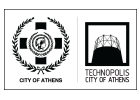Roars of cosmic beasts
The spacetime in which we are continuously “running’’, vibrate due to cosmic thunders that burst at distant corners of our Universe. These vibrations reach us as tiny deformations of spacetime that we are completely unable to feel. In the last two years the human race succeeded in building extremely sensitive apparatuses –gravitational wave detectors- that are able to monitor the ripples of spacetime. By analyzing the signals of these detectors we could study the sources of gravitational waves themselves, that is, colliding small dark astrophysical objects in cosmic distances away from us. These detectors are actually a new kind of observatories of the Cosmos.
Participants:
Theocharis Apostolatos, Associate Professor, National and Kapodistrian University of Athens
Theocharis Apostolatos was born in Athens in 1966 and studied Physics in the National and Kapodistrian University of Athens. In 1989 he was accepted to pursue his doctoral studies in Caltech, from where he got his PhD in Physics, under the supervision of Professor Kip Thorne [Nobel Laurate 2017]. After his postdoctoral studies in the Max Planck Institute in Germany he was appointed Lecturer in the University of Athens where he works up to now. His research field includes General Relativity, black holes and gravitational waves.





